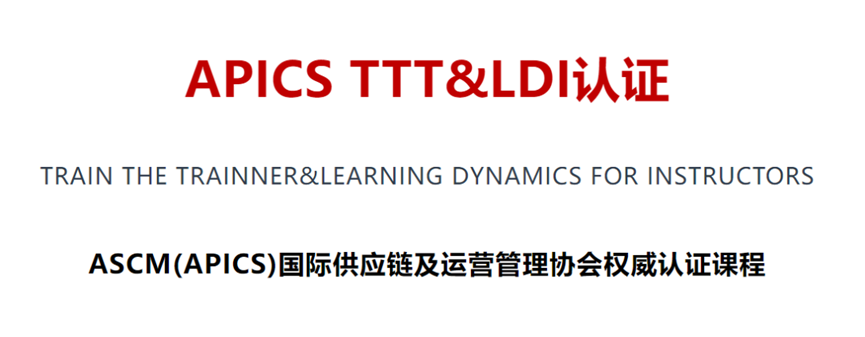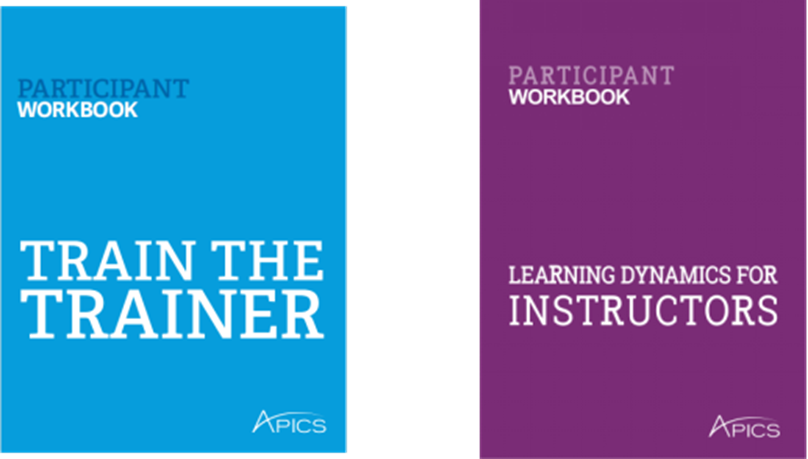
关于ASCM
ASCM(全称The Association for Supply Chain Management) 国际供应链及运营管理协会是全球认可的供应链管理专业机构,它提供了全球供应链领域前沿、权威、高含金量的学习体系,也是被全球知名企业认可的供应链管理机构。
关于联韬ASCM
上海联韬企业管理咨询有限公司自2005年起引入ASCM(原APICS)的国际化供应链专业知识体系到中国。在过去的18年中,我们致力于承办四个全球化的高品质、高含金量的认证项目:CPIM、CSCP、CLTD和SCOR的教育培训和考试管理。作为ASCM亚太区的Premier Elite合作伙伴,联韬聚集了一批优秀的Master讲师,并已为1,500多家企业和20,000多名学员提供了服务。联韬专注于构建和改善企业运营体系,以及战略和战术的组织规划,旨在助力企业实现更高水平的发展。
TTT&LDI认证背景
参加ASCM授权讲师的培训课程TTT(Train the Trainer)和LDI(Learning Dynamics for Instructors),是获得ASCM讲师资格的必备条件之一。讲师资格分为Recognized(授权)讲师和 Master 讲师。取得ASCM讲师资格就可以教授ASCM的相应认证的课程(CPIM, CSCP, CLTD)。
TTT&LDI认证特色
■ Master讲师为您提供一套行之有效的、适用于各种培训项目的教学方法。
■ 可选同步参与TTT&LDI的线上课程。
■ 小班授课, 更多互动、个人展示和点评机会。
■ 由Premier Elite合作伙伴——联韬背书,申请ASCM讲师资格。
■ 有机会成为联韬的兼职/专职讲师,获得更多公开课、企业内训、研讨会的授课机会。
■联韬将全程协助您获得讲师资质。
获得ASCM授权讲师的个人价值
■ 教学相长;提升职业能力,获得更多的职业发展机会。
■ 通过授课,丰富理论知识以及领悟不同企业的管理实践。
■ 享受知识分享带来的愉悦感和个人价值回报的成就感。
■ ASCM授权讲师,全球认可,为职业生涯再添一笔华彩。
TTT&LDI认证目标
■ 学习授课技巧和培训课程管理经验
■ 在课堂中获得 Master 讲师授课风格指导
■ 通过试讲、演练,掌握培训要点并提升授课技能
■成为ASCM授权讲师资格
TTT&LDI适合对象
■ 资深的企业供应链管理总监、咨询师、内训师、兼职培训师等供应链专业人士
■ 已获得CPIM/CSCP/CTLD的证书
■ 有志成为兼职或专职的供应链管理的授权讲师。
TTT&LDI培训师资
■由具有精湛讲课技巧和丰富实践经验ASCM授权TTT&LDI Master讲师授课。
TTT&LDI学习资料
课程使用的TTT&LDI教材包含:
■ 2本英文官方原版纸质教材
■ PDF电子版教材
■ 随堂练习资料

ASCM讲师申请条件
■ 获得CPIM/CSCP/CTLD的证书
■ 参加TTT&LDI培训并达到讲师考核标准
■ 联韬出具背书文件
■ ASCM会员有效期之内
ASCM讲师资格维护
■ ASCM证书维持有效
■ ASCM会员维持有效
■ 维护周期- 5年
■ Recognized Instructor(授权讲师)--在5年内授课时数不低于75小时。
Master Instructor -- 在5年内授课时数不低于300小时。
TTT&LDI培训费用
■ 线下课程费用:TTT 4,400元 + LDI 4,400元 (支持线上同步听课)
以上费用包括:培训、教材、午餐
- TTT-Train the Trainer (2天) ●LDI-Learning Dynamics for Instructors (2天)
TTT&LDI线下课表

附:课程大纲(英)
TTT Course Outline
Course Overview
Lesson 1: Introduction to Train the Trainer
? Introductions
? Instructor and Learner Agreements
? Learning Insights and Action Items
Lesson 2: Basics of Successful Training
? Attributes of Successful Training
? The Training Steps
? Effective Communication
? Stages of Interpersonal Communication
? Components of Communication
? Questioning
Lesson 3: Learning Objectives and Lesson Plans
? Learning Objectives
? The Lesson Plan
Lesson 4: Media Basics
? Structuring the Physical Environment
? Using Media Effectively
Lesson 5 Practice Instruction
? Five-minute Presentations
Lesson 6 Learning Styles and Motivation
? Learning Styles
? Motivation
Lesson 7 Instructor Logistics
? Instructor Preparation
? Lesson Plans as a Time Management Tool
? Training Challenges
? APICS Instructor Development Program
? Training Evaluations
Lesson 8 Practice Instruction
? 10-minute Presentations
? Course Review
LDI Course Outline
Course Outline
Course Overview
Lesson 1: Introduction to Learning Dynamics for Instructors
- Instructor and Student Agreements
- Learning Insights and Action Items
- Extemporaneous Speaking
- APICS Instructor Community
- APICS Instructor Development Program
- Personal Development Plan (Step 1)
Lesson 2: Essential Training Practices
- Key Elements of Successful Training
- Body Language
- Bloom's Taxonomy
- Active Versus Passive Training Methods
- Impact of How People Learn on Objectives and Lesson Plans
Lesson 3: Establishing An Adult Learning Environment
- Motivation
- Principles of How Adults Learn
- Learning Environments
- Kolb Experiential Learning Model
- Learning Style Activity
Lesson 4: Effective Listening Skills
- Effective Listening Skills
- Practice Listening
Lesson 5: Techniques and Methods For Retention
- Brain-Based Learning
- Cognitive Learning Theory
- Effective Instructional Strategies
- Learning styles/VARK
- Left Brain/Right Brain
- Theory of Multiple Intelligences
- Criteria for Selecting Training Methods
- Review and Retention
Lesson 6: Questioning Skills
- Asking Effective Questions
- Handling Learners Answers
- Handling Learners Questions
Lesson 7: Managing Classroom Dynamics
- Six-Step Process for Challenging Situations
- Challenging Situations Activity
- Empathy as a Tool for Class Management
Lesson 8: Planning For The Future
- Training Evaluation
- Personal Development Plan
– Step 2
– Step 3
– Step 4